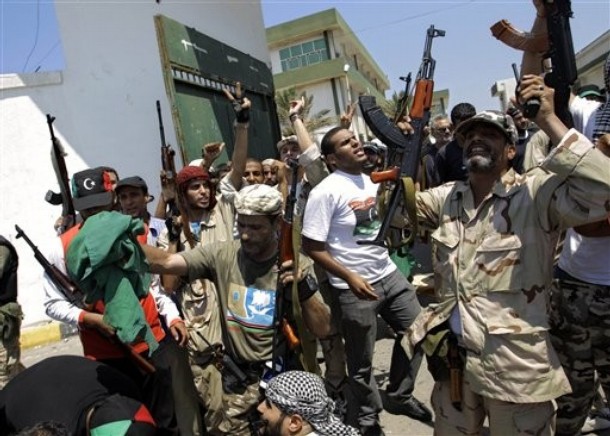
From Karen DeYoung and Greg Miiler, the Washington Post: The rapid weekend advance of Libyan rebel troops into Tripoli was the result of an opposition strategy put in place two weeks ago with the advice of British, French and Qatari special forces on the ground , along with an earlier decision by the Obama administration to share additional intelligence on the positions of Libyan government forces, according to NATO and U.S. military and intelligence officials. . . .
The objective, a senior NATO official said Monday, was to create a “pincer” that would drive forces loyal to Moammar Gaddafi back from all directions to protect Tripoli. In the process, government troops would provide clear targets for NATO airstrikes and the roads would clear for the rebel advance. . . .
Even before the pincer movement began, the United States had begun to provide its allies with expanded imagery from satellites and armed drones on the locations and capabilities of government forces.
At the same time, CIA operatives inside the country and intercepted communications within the government provided a deeper understanding of just how badly Gaddafi’s command structure had crumbled, U.S. officials said.
The collapse could be traced to “two things,” said a high-ranking U.S. military official. ”One was the knowledge that we had on the disintegration of the command structure of the Gaddafi forces. . . .”
“The second thing, in the lead-up into Tripoli we really provided a lot of imagery on the locations of the Gaddafi forces,” the official said. “So as the rebels were getting into their positions when they came around the south and up into the west side of Tripoli, we had a good sense of where [Gaddafi’s] forces were at.”
That intelligence flow had been obstructed for most of the early months of the conflict, officials said, in part because of restrictions on the amount of information that could be given to NATO allies.
But the administration reached a decision about six weeks ago that enabled the sharing of more sensitive materials with NATO, including imagery and signals intercepts that could be provided to British and French special operations troops on the ground in addition to pilots in the air.
The NATO allies and “particularly the Qataris” on the ground were “working very closely” with the rebels’ military and political command “to help them think this one through and also provide them with the capabilities,” the NATO official said. (photo: AP)
Image: ap%208%2022%2011%20Rebels%20in%20Tripoli.jpg
